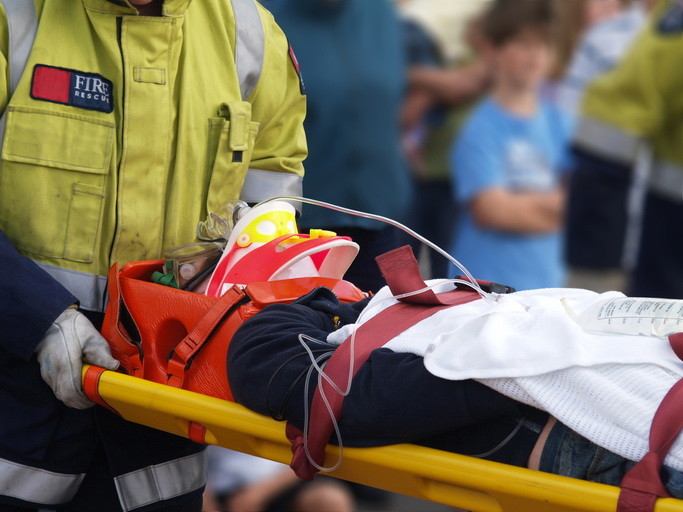Brain injury is not just common in car accidents but in construction accidents as well. If you suspect that you or your loved one is suffering from a brain injury from a construction fall, know that our Eason & Tambornini personal injury lawyers can help with your construction accident case. We can help you understand the causes of traumatic brain injury, symptoms of brain bleeding after hitting the head, bleeding in the brain after a fall, and developing head injury symptoms days later. If you have any concerns about brain injury after a construction accident, please do not hesitate to give us a call.
Learn more about our Sacramento Construction Accident Attorney Services.
What is the cause of traumatic brain injury?
Traumatic brain injury is any injury to the brain resulting from a blunt force to the head. This can be caused by vehicular collisions like car and motorcycle accidents, playing contact sports such as football and boxing, violence such as a gunshot wound to the head, and falls.
is any injury to the brain resulting from a blunt force to the head. This can be caused by vehicular collisions like car and motorcycle accidents, playing contact sports such as football and boxing, violence such as a gunshot wound to the head, and falls.
When the head sustains a decisive blow, the brain, which is free-floating in cerebrospinal fluid, hits the hard surfaces of the skull. This will immediately result in damage to the brain’s soft tissues and skull fractures. There will be bleeding of the brain’s structures and activation of the inflammatory process.
The primary injuries won’t stop here, though. The neurons will respond to the effects of the primary injuries, which will lead to further complications and lifelong impact of TBI.
What are the symptoms of a brain bleed after hitting the head?
The external force could cause numerous injuries to the brain. The neurons are stretched and sometimes even torn. Fractured skull fragments could penetrate the soft tissues and cause bleeding. The damaged tissues could bleed into the surrounding areas, cause hemorrhaging, and increase the intracranial pressure.
The scary thing is that these injuries are all invisible, especially if there are no apparent head wounds, so you need to know the symptoms to watch out for in case of brain bleeding. These may include but are not limited to nausea and vomiting, cerebrospinal fluid leakage, blood coming out of the ears, motor problems like paralysis and incoordination of movements, cognitive problems like speech problems and poor judgment and decision-making, lethargy and inattentiveness, vision changes, seizures, and muscle weakness, tingling, and numbness.
Any of these symptoms could mean that the accumulation of blood is already compressing the brain and affecting its functions.
What happens if there is bleeding in the brain after a fall of an elderly individual?
Older adults are more at risk for falls because of their unstable joints, weaker reflexes, weaker muscles, and poor posture. It’s also easier for them to sustain bleeding in the brain after a fall, even if the trauma was mild.
When they fall and hit their head, the brain sustains injuries, including minor bleeding into the subdural space, the space between the arachnoid mater (the middle layer of the membrane that covers the brain), and the dura mater (the outermost layer of the membrane). A few days after the fall, the bleeding becomes a hematoma (blood clot) that slowly increases in size and affects the brain structures and functions.
Symptoms include altered mental state, seizures, motor and cognitive problems, and headaches. Due to a chronic subdural hematoma, they can even develop Alzheimer’s disease and dementia caused by a fall or head injury.
Is it normal to develop head injury symptoms days later after a fall or accident?
It’s more common to have TBI symptoms as soon as the injury occurs. This means prompt and proper medical attention could be provided to prevent complications and worsening of TBI symptoms. However, in some people, the symptoms appear only a few days after the accident.
Traumatic brain injury is often called the invisible disability. Even though there are no apparent signs of a brain injury, small pathological changes are still occurring inside the brain. In time, these changes worsen and affect the brain’s functions. This is why you must receive medical care immediately after a fall or an accident so proper head injury treatment can be given.
Many symptoms of brain injury need prompt medical attention, especially if it’s been days after the fall, are persistent headaches, sleep changes, memory and mood problems, seizures, sensitivity to light and noise, sensory and motor affectation, speech and language problems, inattentiveness, etc.
What can you do?
The negligence of another sometimes causes construction accidents. For example, you slipped on a wet floor and hit your head, and there was no signage to warn you of the danger. Or you fell down the stairs of an establishment because of a broken step the owner failed to fix.
If this happened to you and you’re now suffering from TBI symptoms, call us immediately, and we’ll assist you with the legal process. Our lawyers will help you understand traumatic brain injury and its causes, symptoms of TBI and brain bleeding, what TBI caused by a fall does to the elderly, and why it’s common to develop TBI symptoms later, even if it’s been days or weeks. Our Eason & Tambornini construction accident attorneys in Sacramento are just a phone call away and will answer your questions regarding brain injury from a fall.
The information provided on this blog is for informational purposes only and not a substitute for professional medical advice, diagnosis, or treatment. Always seek the advice of your physician or other qualified health provider with any questions you may have regarding a medical condition. Never disregard professional medical advice or delay in seeking it because of something you have read on this blog.
